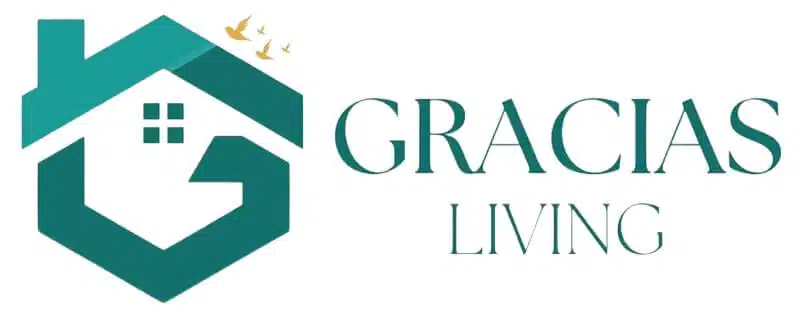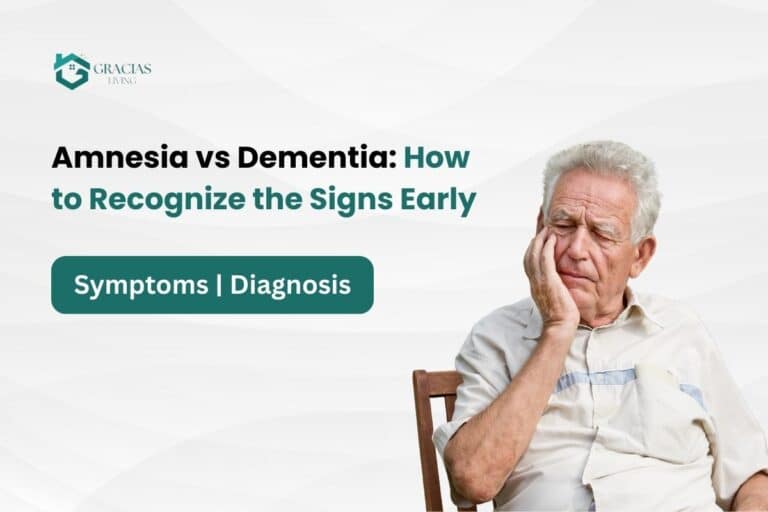Quick Summary of the article:
- Participating in routine activities helps dementia patients retain independence in daily tasks for as long as possible.
- Engaging in mental exercises and therapies helps slow cognitive decline, preserving memory and problem-solving skills in dementia patients.
- Structured activities and therapies provide a sense of purpose and enjoyment, reducing feelings of anxiety, depression, and agitation.
- Physical activities tailored for dementia patients improve mobility, balance, and overall physical health.
- Group activities encourage socialization, combating feelings of loneliness and isolation, and promoting emotional well-being of dementia patients.
Dementia is a complex and progressive condition that affects millions of people worldwide.
It is characterized by a decline in cognitive function, affecting memory, thinking, language, and the ability to perform everyday activities.
While there is no cure for dementia, various innovative therapies and activities have been shown to significantly improve the quality of life for patients by stimulating cognitive function, enhancing mood, and providing a sense of accomplishment: research findings and practical examples back these therapies and activities.
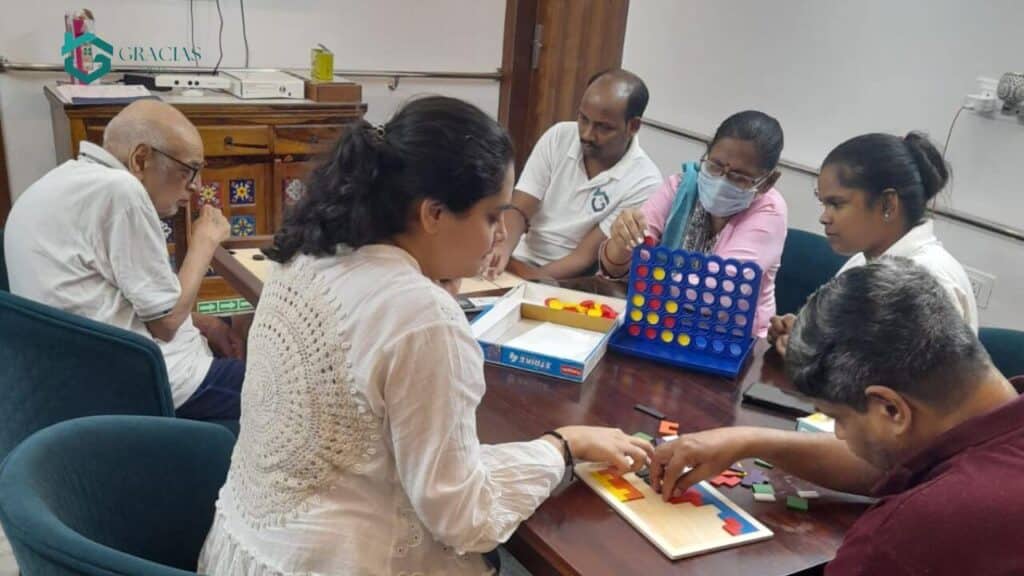
Dementia Therapies and Activities for Stimulating Cognitive Function and Improving Well-Being
Caring for individuals with dementia requires more than just meeting their basic needs; it demands a deep, empathetic understanding of their experiences and a commitment to enriching their lives in meaningful ways.
These Therapies and activities help dementia patients by stimulating Cognitive function and improving their well-being.
1. Music Therapy
Benefits:
- Emotional Connection: Music has a powerful ability to evoke memories and emotions, providing comfort and reducing anxiety in dementia patients. Listening to familiar songs can trigger pleasant memories and feelings of joy.
- Cognitive Stimulation: Engaging in musical activities such as singing, playing instruments, or even just listening to music can stimulate different areas of the brain, promoting cognitive function and potentially slowing cognitive decline.
- Social Interaction: Group music sessions encourage socialization and interaction among patients, reducing feelings of isolation and fostering a sense of community.
Research Findings:
- A study published in the Journal of Alzheimer’s Disease (2018) demonstrated that personalized music playlists could significantly reduce symptoms of depression and anxiety in dementia patients. The study found that patients who listened to their favorite music showed improved mood and reduced agitation.
- Another study in the Journal of Music Therapy (2013) showed that music therapy sessions led to improvements in cognitive function and communication skills in individuals with dementia.
Practical Example:
- At Gracias Living, residents participate in group sing-alongs, dancing, and personalized music listening sessions, which have been shown to improve their mood and cognitive engagement.
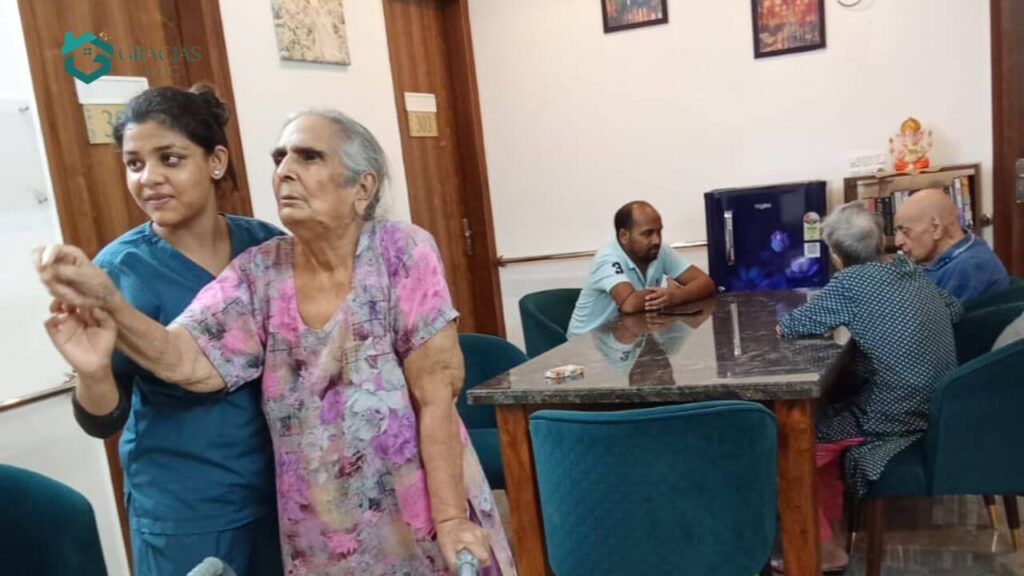
2. Art Therapy
Benefits:
- Self-Expression: Creating art provides a non-verbal way for dementia patients to express their emotions, thoughts, and memories, which can be particularly valuable for those who have difficulty communicating verbally.
- Cognitive Engagement: Art activities such as painting, drawing, and sculpting stimulate brain areas related to creativity and problem-solving, promoting cognitive function.
- Motor Skills: Engaging in art activities helps maintain and improve fine motor skills, which can decline with dementia.
Research Findings:
- A study published in the Journal of Aging and Health (2014) found that art therapy sessions led to improved mood, cognitive function, and social interaction in older adults with dementia. Participants showed increased engagement and communication during art activities.
Practical Example:
- Gracias Living offers art therapy sessions where residents can explore various art forms. These sessions are designed to be relaxing and enjoyable, providing dementia patients with a creative outlet and opportunities for socialization in our trusted dementia care in gurgaon facility.

3. Reminiscence Therapy
Benefits:
- Memory Stimulation: Reminiscence therapy involves discussing past experiences and memories, which helps stimulate long-term memory and cognitive function during different stages of dementia. It can also provide emotional comfort and a sense of identity.
- Emotional Comfort: Recalling happy memories can provide emotional stability and comfort, reducing anxiety and depression.
- Social Bonding: Sharing stories and memories with family members or caregivers strengthens relationships and fosters a sense of connection.
Research Findings:
- Research published in the International Journal of Geriatric Psychiatry (2012) indicates that reminiscence therapy can improve mood, cognitive function, and communication skills in dementia patients. The study found that patients who participated in reminiscence sessions showed greater engagement and improved social interaction.
Practical Example:
- At Gracias Living, reminiscence therapy sessions are conducted in group settings where patients share their life stories and experiences. These sessions often include the use of photos, music, and other memorabilia to trigger memories and encourage conversation.
4. Physical Exercise
Benefits:
- Cognitive Benefits: Regular physical activity has been linked to improved cognitive function and slower cognitive decline. Exercise increases blood flow to the brain, promoting brain health and neuroplasticity.
- Physical Health: Exercise helps maintain physical health, reducing the risk of comorbidities such as cardiovascular disease and diabetes, which can exacerbate dementia symptoms.
- Mood Enhancement: Physical activity releases endorphins, which improve mood and reduce stress, anxiety, and depression.
Research Findings:
- A study from the Journal of Alzheimer’s Disease (2017) reported that moderate exercise, such as walking or yoga, can improve cognitive function and slow the progression of dementia symptoms. The study found that patients who engaged in regular physical activity showed better cognitive performance and reduced symptoms of depression and anxiety.
- The Lancet (2018) published a comprehensive review highlighting the benefits of physical exercise for dementia patients, emphasizing that aerobic exercise and strength training can improve cognitive function, physical health, and overall quality of life especially at the best facility for dementia patients.
Practical Example:
- Gracias Living offers a variety of exercise programs tailored to the needs and abilities of dementia patients. These include gentle yoga, tai chi, walking groups, and chair exercises. The programs are designed to be enjoyable and engaging, encouraging regular participation.
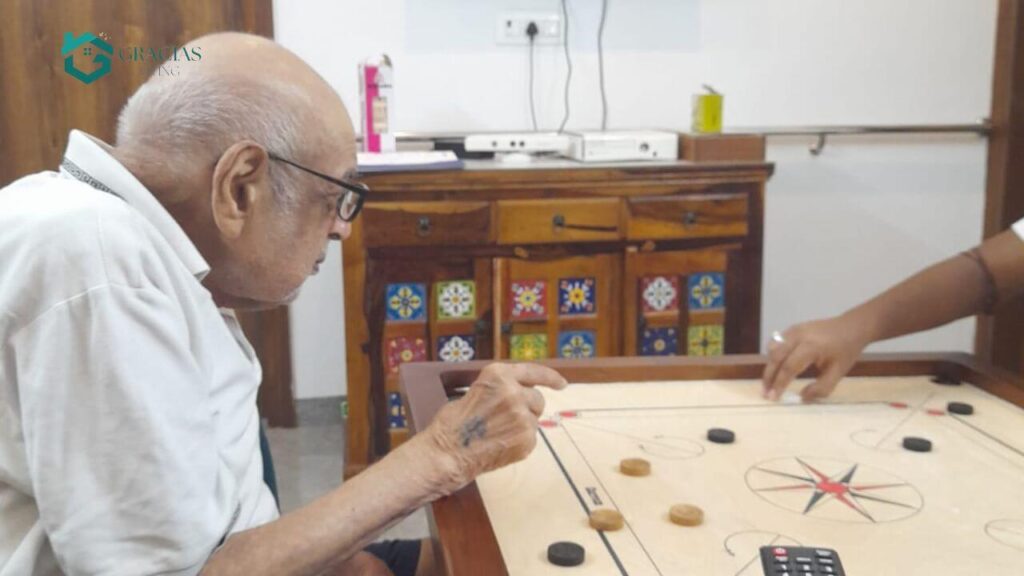
5. Cognitive Stimulation Therapy (CST)
Benefits:
- Cognitive Exercises: Structured group activities, such as puzzles, memory games, and brain teasers, enhance cognitive function and slow cognitive decline, especially after an early diagnosis of dementia.
- Social Engagement: Group settings promote social interaction and communication, reducing feelings of isolation and improving mood.
- Skill Maintenance: Regular cognitive challenges help maintain cognitive abilities and promote mental sharpness.
Research Findings:
- A meta-analysis published in the Cochrane Database of Systematic Reviews (2012) concluded that CST can improve cognitive function and quality of life in people with mild to moderate dementia. The analysis found that patients who participated in CST showed significant improvements in cognitive performance and daily functioning.
- The Journal of the American Medical Directors Association (2018) reported that CST programs led to improved cognitive function, mood, and social interaction in dementia patients.
Practical Example:
- At Gracias Living, CST sessions are conducted in small groups, allowing patients to engage in stimulating activities such as word games, puzzles, and memory exercises. These sessions are designed to be enjoyable and challenging, promoting cognitive health and social interaction.
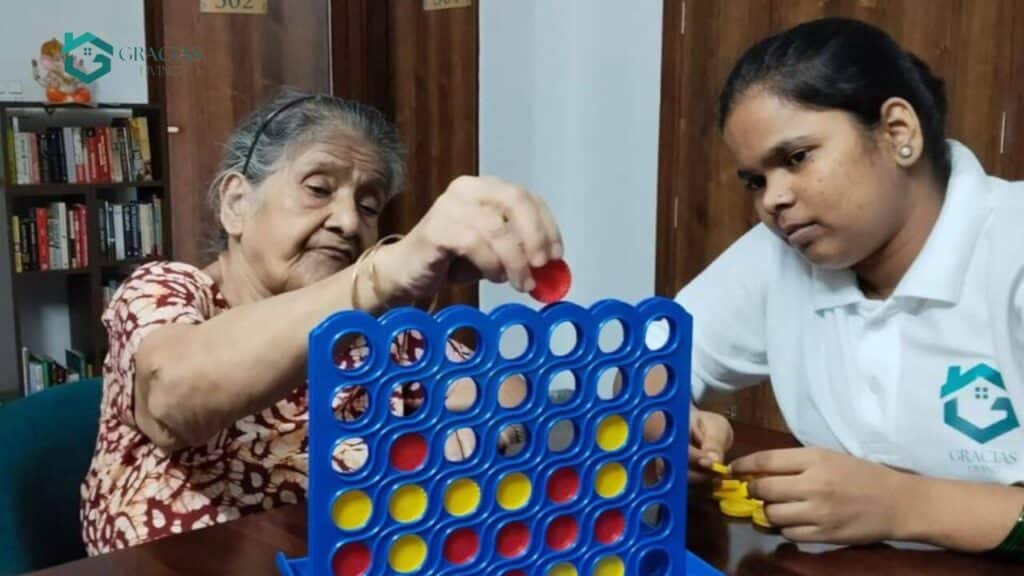
How Can Therapies and Activities Help Dementia Patients?
Activities and therapies play a major role in the improvement of the life of dementia patients. Although there is no cure for the disease, the interventions are meant to boost the brain, enhance cognitive abilities and behavioral and psychological symptoms.
By participating in meaningful activity, patients can develop some sense of purpose and normalcy and should be capable of overcoming frustration, anxiety and depression. The sessions are a facilitated and guarded setting that supports communication and socialization, which contrasts with the social isolation that otherwise typifies the disease.
Finally, they focus attention on what is lost instead of what can be done to help people maintain their dignity and self-respect.
Goals of Dementia Therapies or Activities?
The main objectives of dementia therapies and exercises are to sustain cognitive abilities, enhance emotional well-being and sustain physical well-being. All these aims are interrelated and are aimed at offering an integrative care model.
Optimize Cognitive Function
Puzzle and memory cognitive stimulation therapy may be used to optimize brain activity, and that may slow the cognitive decline process and maintain cognitive ability in language, problem-solving skills, and memory as long as possible.
Enhance Emotional Well-being
Therapeutic music and art interventions can improve emotions by allowing an individual to communicate, express himself/herself, and alleviate anxiety, agitation, and depression. They are able to induce positive memories, relax an individual, and offer happiness and a feeling of belonging.
Strengthen
Exercise on a daily basis, even the simple ones such as walking or stretching, can enhance strength, balance, and mobility. Exercising is also beneficial to mental health because stress levels decrease, and the quality of sleep also goes up.
Cultivate Dignity and Independence
Allowing the patients to participate in activities of daily living and to control the choices provides them with a feeling of control and purpose. These activities hinge on their capabilities, and thus, they can be effective and convey a sense of accomplishment that they need to foster dignity.
What support is available for dementia patients and caregivers?
Dementia care is not limited to formal therapies but covers a lot of resources for both the patients and the caregivers. The care is required to address the daily problems of the disease and to avoid caregiver burnout.
Caregiver Support Groups: These are groups that offer an encouraging environment where caregivers are allowed to exchange their stories, difficulties, and coping strategies. The emotional support that caregivers might feel isolated can be cleared by having the support of other people who go through the same experience and help them feel that they are not alone.
Respite Care: Respite care facilities provide respite caregivers with a short rest so that the caregivers are allowed to rest, and a professional caregiver can provide the care to the patient. It could be a few hours or a few days, and has a significant role to play in the health and well-being of the caregiver.
Educational Workshops and Training: The care of dementia in the form of workshops conducted by health care workers and organizations involve such aspects as communication skills, aggression management, and financial and legal planning.
Community Resources: The community dementia groups, senior centers, and assisted living communities offer a variety of services, including daily activities to patients, social activities, and a referral to a professional network of social workers and counselors.
Sensory Activities
Sensory activity is another very critical element of dementia care, especially in persons who are at more advanced dementia stages of the disease. These activities will be based on the use of the five senses of sight, sound, touch, taste, and smell to bring in comfort, anxiety reduction, and pleasant memories without the onus of cognitive needs.
Touch: It can be very relaxing and grounding with the use of objects with various textures, e.g., soft blankets, smooth stones, or a fidget spinner. Perfumed lotion massage of the hands can also prove to be comforting and bonding.
Smell: Sweet or typical smells, such as a favorite perfume, fresh bread, or a scented candle, may be very strong reminders and cause strong emotions. Lavender or peppermint oil aromatherapy can be either relaxing or invigorating, along with proper nutrition and dementia.
Vision: Sifting through photo albums, nature documentaries or even just taking in a beautiful garden can be a good and relaxing experience. For exciting visual effects, calming light, and bright, stimulating objects could also serve.
Sound: It is very therapeutic to listen to music that one likes, the sounds of nature, or even to listen to an audiobook. Using familiar music in the youth will most likely bring about positive and pleasant memories even at an advanced stage of the disease. Taste: it can be soothing and rewarding to the palate when food or something to drink that you like is involved. A simple but effective way of associating with someone with dementia would be to offer a little amount of a favorite candy or a glass of a favorite tea.
Conclusion
By integrating these therapies and activities into our Dementia Care facility at Gracias Living, we create a supportive and enriching environment that promotes cognitive health, emotional well-being, and social engagement for dementia patients.
Innovative therapies and activities have profoundly impacted the lives of dementia residents at Our Assisted Living facility.
By adopting these approaches, our caregivers and healthcare professionals are making a significant difference in the lives of dementia patients, helping them live more fulfilling and engaged lives.
Frequently Asked Questions
1. How do therapies and activities benefit dementia patients?
Advantages associated with therapies and activities among dementia patients include the therapist activating cognitive abilities, enhancing mood and emotional mood, and making them more active. They assist in the treatment of behavioral symptoms, decreasing anxiety and depression and providing a sense of purpose and dignity by concentrating on what the person can do.
2. Are therapies the same as recreational activities?
Although they may be used interchangeably, therapies are more formal and usually include a certain therapeutic objective, e.g., better speech (speech therapy) or movement (physical therapy). A recreational activity like painting or listening to music is less organized but will yield a good reward of relaxation, enjoyment, and socialization. The two are significant elements in an interdisciplinary care plan.
3. How often should dementia patients engage in therapies activities?
Its intensity depends on the level of dementia, health, and individual interest of the patient. Consistency is necessary. It is usually recommended to have a daily routine of cognitive, physical, and social activities. Attempt to prevent over-scheduling to prevent fatigue or frustration.
4. What types of therapies and activities are most effective for dementia patients?
The best types of treatment are those that are made in a manner that is individualized to both the interests and the capability of the individual. An illustration is a patient who happens to be a musician would respond well to music therapy, and a patient who is interested in art may respond well to art therapy. The interactive and meaningful treatments are the best therapies to be used with the patient.
5. Are therapies and activities suitable for all stages of dementia?
Yes, therapies and activities are positive at all the dementia stages but the emphasis and the nature of such activity will differ. To start with, cognitive stimulation and recalling of previous events will be emphasized during the activities. Subsequently, there is sensory stimulation, comfort, and emotional bonding, which are emphasized with the help of activities like soothing music, aromatherapy, and touch objects.
